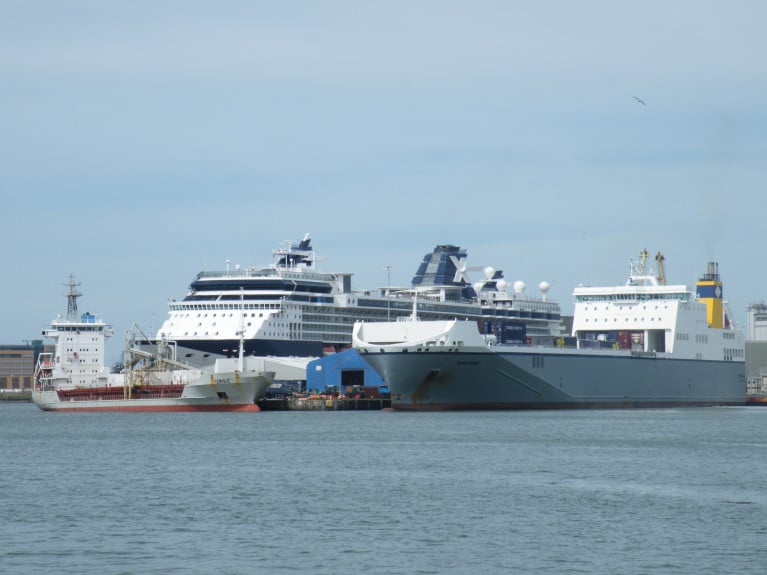Displaying items by tag: Motorways of the Sea (MoS)
Webinar: Shaping Policy of a European Maritime Space-The Future of Motorways of the Sea (1 July)
A Motorways of the Sea (MoS) webinar "Shaping the Policy of a European Maritime Space – The Future of Motorways of the Sea" is to take place on Wednesday 1st July 2020 (09h30 – 11h15).
The Motorways of the Sea (MoS) concept launched in 2001, is the maritime pillar of the trans-European network (TEN-T). It consists of short-sea routes, ports, associated maritime infrastructures, equipment, facilities and relevant administrative formalities.
MoS contributes towards the achievement of a European Maritime Transport Space without barriers, connecting Core Network Corridors by integrating maritime links with hinterland. In doing so, it aims at providing more efficient, commercially viable and sustainable alternatives to road-only transport.
To registrar for the webinar, fill in the form by clicking here.
Below is a draft agenda of the Webinar
The Webinar beginning at 0930hrs will be introduced by Prof. Kurt Bodewig, European Coordinator
09h35 The new priorities of the MoS Detailed Implementation Plan 2020 and the results of its underlying study
10h00 The state of play of the CEF maritime portfolio
10h10 Round table discussion: Shaping the policy of a sustainable, smart and seamless
European Maritime Space
Topics:
• The view of a core port
• The view of a comprehensive port
• The view of a shipping line
• The view of a terminal operator
11h10 Conclusions & outlook by Prof. Kurt Bodewig, European Coordinator
End of Webinar
For much more about the MoS click their website homepage here.
Bay of Biscay Ferry Route Nantes-Vigo Wins €27m Subsidy
#MotorwayOfTheSea – The France-Spain ‘motorway of the sea’ (MoS) ro-ro service between the Atlantic ports of St. Nazaire (Nantes) and Vigo, with capacity for 100 unaccompanied trailers is to benefit from €27 million in state aid, with both countries each contributing €12 million in funding.
The service will also benefit from a €3 million subsidy from the European Union within the framework of its ‘Marco Polo’ sustainable freight transport programme.
Lloyd’s Loading List.com understands that the €27 million in funding is to be spread across seven years, ensuring the economic viability of this MoS service in the mid-term and giving hauliers an alternative to crossing much of France and Spain by truck. The transit time of the St.Nazaire-Vigo ferry is 27 hours.
Also according to Lloyds, a rival to the ‘freight-only’ service operated by Suardiaz Atlántica was LD Lines St Nazaire-Gijón route that closed in September 2014. The company withdrew its three-times-weekly MoS service as public sector subsidies totalling €34 million over a period of four years were not prolonged. For more on the story, click here.
Afloat.ie adds that LD Lines also that month closed two UK-Spain Routes from Poole, Dorset. The passenger and freight company were citing reasons to close were due to a 'business review' of operations.
LD Lines had operated the ro-pax Norman Atlantic (2009/26,904gt) on the St Nazaire-Gijón route and on an Irish leg of the landbridge route to Spain, this been St. Nazaire-Rosslare. This double route service, Rosslare-St.Nazaire-Gijón, was historic in that it was the first ferry connecting Ireland and Spain, albeit via France.
The ferry launched the Irish route under the name Scintu (see, photo), having served service in the Mediterranean. She was renamed to reflect her 'Atlantic' routes role.
The Rosslare-St.Nazaire route begin in early 2014, however the service suffered an interruption when the Visentini built ro-pax taken off service for three months in March. This was initially to dry-dock the Norman Atlantic and it is understood the ro-pax boosted capacity in support of her sister, Norman Astuarias (2007/26,904) on the France-Spain leg of the route.
In June, the 550 passenger Norman Atlantic (see, photo) resumed the 22 hour route between Wexford and the Loire-Atlantique, yet this would only last to late August when LD Lines completely pulled the plug on the Irish route.
Another Bay of Biscay route was proposed between the Port of Cork Company and the Port of Gijon which was due to began in March 2011. Dialogue with potential operators and investors in the project, however proved more challenging given then the business climate to establish the direct Ireland-Spain service.
Returning to LD Lines and following the closure of the France-Spanish service, the Norman Atlantic was chartered to Anek Lines. Tragically her last sailing took place almost a year ago in late December 2014 when fire broke-out on the vehicle deck. The incident occured 80 miles west of Corfu during a sailing from Patras, Greece to the Italian port of Ancona.
According to Ships Monthly, high seas and strong winds hampered rescue operations, with fatalities on board, along with two crew members who died on an Albanian tug when a tow line snapped.





























































